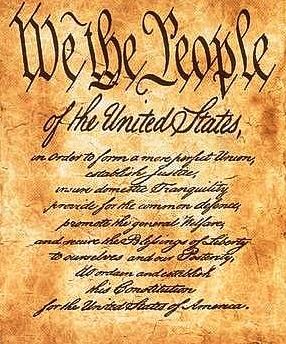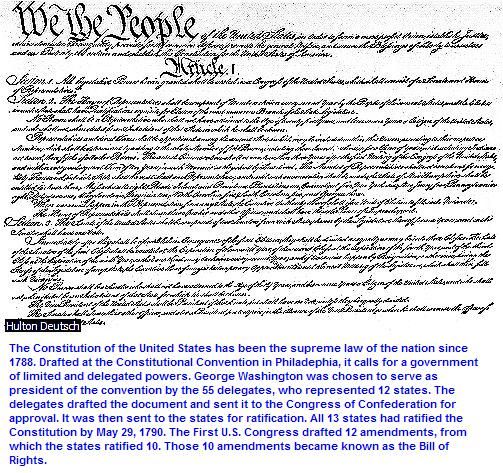ça va sans dire
(French)
it goes without saying
c'est-à-dire
(French)
that is to say; namely
Constitution of the United
States of America.(pic
of US)
A system of fundamental laws of the United States
of America, the first ten amendments of which are called the Bill of Rights.
It is based upon the
Articles of Confederation, which was the first constitution.of
the United States.
The U.S. Constitution provides for a federal system,
by the individual states having granted to the federal government certain
powers for the exercise of the national government, retaining severally
the right of Eminent Domain over the lands within the boundaries of their
own individual states.
The United States of America in its constitution
assured that no large state such as say California, would be able to use
its massive population base.(majority rule).to
override concerns of say tiny Rhode Island..All.states
have two senators and one governor. On the surace it appears as an equitable
setup and


something Canadians should at least consider if
they ever get around to setting up a proper federal government, as her
sisters Ireland, South Africa, New Zealand, Australia, etc. have already
done.
From Michal
Tsarion:."They
insist that the so called "United States" is not the same thing as the
so called "United States of America." Nevertheless, due to deliberate
misinformation and conditioning, most people do believe that the terms
refer to one and the same entity. They are certainly not inclined to think
of the "United States" (the U.S.) as a foreign corporation..
Furthermore,
the drafters of the Constitution intentionally saw to it that the term
"United States" had more than one meaning. Specifically, they knew
the term did not refer to citizens of a state. Once upon a time, in America,
you could have been a citizen of a state without being a citizen of the
nation. This political idiosyncrasy did not suit the Federalists and so
they ingeniously manipulated the words and terms we have become familiar
with. It is a old trick and it serves the cause of totalitarians no end.".They
play with words, the meanings being one thing for them and another for
you; another example.
The Constitution.(picture
of is below).was drawn up by 55 delegates
to the Constitutional Convention in Philadelphia during the summer of 1787
and ratified by the states in 1788.
The Constitution defines distinct powers for the Congress of the United
States, the president, and the federal courts. This division of authority
is known as a system of checks and balances, and it ensures that none of
the branches of government can dominate the others. The Constitution also
establishes and limits the authority of the federal government over the
states and spells out freedoms and liberties for U.S. citizens.
Forces That Shaped The US
Constitution:.In 1774 the Parliament
of Great Britain capped a series of abuses against the American colonies
by imposing a tax on tea imports to the colonies. The colonies quickly
agreed to convene a Continental Congress, which
in 1776 appointed two committees; one to draft the Declaration of Independence
and the other to prepare a "form of confederation" among the colonies.
In 1778 this second committee produced the Articles of Confederation. They
took effect in 1781 when Maryland, the last holdout state, ratified them.
The Articles of Confederation, the first constitution
of the United States, established a league of friendship among the states,
but not a political union. Each state remained separate and sovereign (under
self rule). The central government consisted of a one chamber Congress,
in which each state had a single vote. Congress had few powers, lacking
even the authority to impose taxes. Any congressional action required the
approval of 9 of the 13 states. The government had no president and no
central court.
After numerous votes settled the details, a committee
on style and revision was assigned in to put the final results in language
to submit to the people for ratification.
Two political dignitaries had great influence
on the creation of the Constitution..John
Locke.(1632-1704), an important British
political philosopher, had a large impact through his.Second
Treatise of Government.(1690).
Locke argued that sovereignty resides in individuals,.not
rulers..A political state, he described,
comes forth from a social contract.(informal).among
the people, who consent to form a government of their creation, in
order to preserve their lives, liberties, and property. In the words of.the
Declaration of Independence, which drew heavily on Locke,."governments
derive their just powers from the consent of the governed, and that a government's
existence can only be justified by its ability to protect the human rights
better than individuals could on their own". (but, it was later
found out, the whole thing
was a con of the people where the would be world controllers would
maintain their conspiracies)
The framers of the U.S. Constitution put the Constitution
above legislative power, indeed, above all governmental powers. The Constitution,
particularly the Supremacy Clause of Article VI, establishes the "rule
of law," the idea that the.government itself, including the president and
Congress, must abide by the law the individual states agreed that they
would follows.
The Constitution had to be ratified by nine states
before it could take effect.
The Constitution spells out in six articles (sections)
the powers of the federal government and the states (the Constitution
does not include the term 'separation of powers').
No member of Congress may serve simultaneously
as a member of the executive branch. This separation differs strikingly
from the Canadian and British practice, in which the prime minister and
other executive officials are.also members
of Parliament (in Canada under some previous regimes it was 'don't trust
the people - we have to control them'; in the USA it was set up
to be 'we don't trust the fed and we are controlling them). Comprised
from Microsoft® Encarta® Encyclopedia 99. © 1993-1998 Microsoft
Corporation. All rights reserved.
The complete United States Constitution is in
Encarta.
cache.noun
the store of goods or valuables concealed in a
hiding place; a hiding place used especially for storing provisions; a
place for concealment and safekeeping, as of valuables; a fast storage
buffer in the central processing unit of a computer
cache,
cached,
caching,
caches.transitive
verbs
to hide or store in a cache
caliper, often calipers.noun-and.verb
an instrument consisting essentially of two curved
hinged legs, used to measure thickness and distances
callous.adjective
being hardened and thickened; having calluses;
feeling no emotion; feeling no sympathy for others
callousness.noun
callously.adverb
calumniate.transitive
verb
calumniated,
calumniating.intransitive
verbs
to slander;
to spread false and harmful statements about
calumniation,
calumniator.nouns
caluminious.adjective
full of calumnies; slanderous
calumny,
calumnies.plural.nouns
a false and malicious
statement meant to hurt someone's reputation; the uttering of such a statement;
slander
calyx.noun,
plural.calyxes
or calyces
the sepals
of a flower considered as a group; a cuplike structure or organ, such as
one of the cuplike divisions of the pelvis or of the kidney; a collecting
structure in the kidney
convene,
convened,
convening,
convenes.verbs
intransitive verb use.to
come together usually for an official or public purpose; assemble formally
transitive verb use.to
cause to come together formally; convoke.(convene
a special session of Congress); call; to summon to appear
convenable.adjective
convener or convenor.noun
camaraderie.noun
a spirit (attitude) of friendly good fellowship;
a spirit of familiarity and trust existing between friends
Cambrian Era.noun
a geological period 570-6000 million years ago
in the
Paleozoic Era, believed
by evolutionists to be marked by the appearance of the first simple marine
animal and plant life, but an era which poses
puzzling questions
camouflage.noun
to disguise;
to change the appearance of, in order to conceal
Canaan.noun
the name signifies 'the lowlands', as distinguished
from the land of Gilead on the east of Jordan, which was a mountainous
district; the extent and boundaries of Canaan are fully set forth in different
parts of Scripture: Genesis 10:19; 17:8; Numbers 13:29; 34:8. Canaan today
is modern physical Israel
canon.noun
an authoritative list of books accepted as Holy
Scripture; a regulation or dogma.decreed
by a church council; the authentic works of a writer; a sanctioned or accepted
group or body of related works (the canon of great literature); an accepted
principle or rule; a criterion or standard of judgment; a body of principles,
rules, standards, or norms
synonym.law
caprice.noun
an impulsive
change of mind; an inclination
to change one's mind impulsively; a sudden, unpredictable action, change,
or series of actions or changes (a hailstorm in July is a caprice of nature)
synonyms.whim,
whimsy, vagary, freak
capricious.adjective
accidental – as caprice;
governed or characterized
by sudden, impulsive and seemingly
unmotivated ideas or actions; impulsive, unpredictable; arbitrary
capriciousness.noun
capriciously.adverb
synonym-inconstant
capsid.noun
the protein shell that surrounds a virus-particle
carbohydrate.noun
any of certain organic compounds composed of carbon,
hydrogen and oxygen, including the sugars, starches and celluloses
conciliate,conciliated,
conciliating,
conciliates.transitive
verbs
to overcome the distrust or animosity of; appease;
to regain or try to regain (friendship or goodwill) by pleasant behavior;
to make or attempt to make compatible; reconcile
intransitive use-to
gain or try to gain someone's friendship or goodwill; pacify
conciliable,
conciliatory.adjectives
conciliation, conciliator.nouns
carbon.noun
The element
with an atomic number of
6 and relative mass
of 12.01.
CO2.(carbon
dioxide)
a colorless, odorless, incombustible gas, formed
during respiration, combustion, and organic decomposition and used in food
refrigeration, carbonated beverages, inert atmospheres, fire extinguishers,
and aerosols. Also called carbonic acid gas
carnal.adjective
bodily, fleshly, physical, temporal (temporary),
corporeal
carnality.noun
carnally.adverb
carpe diem.noun
the admonition to seize the pleasures of the moment
without thought for the future
carriage.noun
posture; deportment;
manner of bearing the body
cede,
ceded,
ceding,
cedes.transitive
verbs
to surrender possession of, especially by treaty;
relinquish;
to yield; grant
courage.noun
the state or quality of mind or spirit that enables
one to face danger, fear, or vicissitudes
with self possession, confidence, and resolution; bravery
courageous.adjective
having or characterized
by courage; valiant; brave
courageously.adverb
courageousness.noun
couch,
couched,
couching,
couches.verbs
transitive verb use.to
word in a certain manner; phrase (couched their protests in diplomatic
language); to embroider by laying thread flat on a surface and fastening
it by stitches at regular intervals; to spread (grain) on a couch to germinate,
as in malting; to lower (a spear, for example) to horizontal position,
as for an attack
intransitive verb use.to
lie down; recline, as for rest; to lie in ambush or concealment; lurk;
to be in a heap or pile, as leaves for decomposition or fermentation
couch.noun
a sofa; a layer of grain, usually barley, spread
to germinate; a priming coat of paint or varnish used in artistic painting
coucher.noun